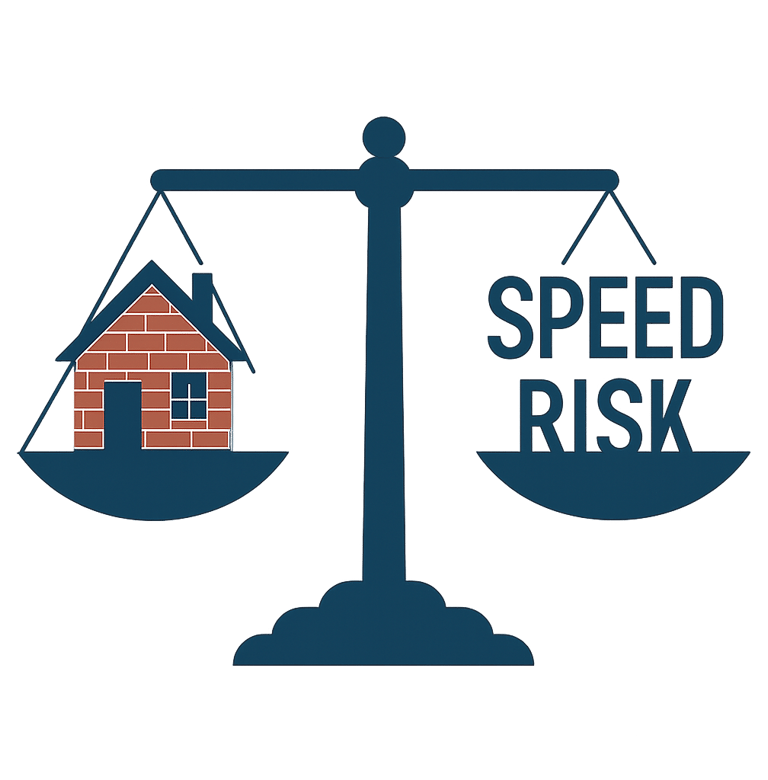Appraisal Waivers: Convenience at a Cost
In today’s fast-paced housing market, appraisal waivers are pitched as a smart shortcut: No appraiser. No inspection. Faster closing. Lower fees. But for informed buyers, the real question isn’t speed—it’s accuracy, risk, and long-term financial security.
Robert G Premecz, SRA
8/10/20252 min read


Appraisal Waivers: Convenience at a Cost
In today’s fast-moving housing market, lenders often promote appraisal waivers as a shortcut. Skip the appraiser. Skip the inspection. Close faster. Pay less.
But smart buyers know that speed without scrutiny invites risk. The real question is not how fast you can close, but whether the deal protects your financial future
Expect Overvaluation Without Oversight
Waiving the appraisal means relying on valuation substitutes. These automated models built by tech platforms rely on estimates or data collectors that have no ethical obligation to be unbiased. They use algorithms and public records, not firsthand observation. They can’t see the condition of your roof, the quality of your upgrades, or the impact of a busy road. In hot markets, they tend to overestimate. In cooling ones, they lag behind reality.
Market Shifts Can Leave You Exposed
If prices drop, you could owe more than your home is worth. That limits your ability to refinance, complicates resale, or increases the risk of foreclosure. And in a downturn, even financially stable and well-qualified homeowners face trouble when equity disappears.
What You Don’t See Can Hurt You
Appraisers aren’t inspectors, but they often catch visible red flags: Failing roofs, Cracked foundations. Unsafe wiring. Structural damage. Safety hazards can escape notice without a trained eye on site. These issues carry repair costs that automated models cannot predict. Additionally, they can cost tens of thousands to fix.
We’ve Been Here Before
Before the 2008 housing crash, lenders leaned on Broker Price Opinions (BPOs) to speed up transactions with quick, low-cost or no-cost estimates often provided by real estate agents. These quick estimates often overstated values and fueled risky lending. When the bubble burst, millions lost homes, savings, and community stability.
Go back further to the Great Depression. The federal government recognized the need for stronger safeguards and guardrails in lending and established the appraisal profession. Appraisers became the trained, impartial, boots on the ground professionals charged with protecting buyers and lenders alike.
Appraisal waivers, AVMs, and BPOs all share one flaw. They prioritize speed and cost over accuracy and safety.
Can an Algorithm Protect Your Future?
If global instability drives up costs or tariffs disrupt supply chains, can a computer model protect your investment?
In uncertain times, algorithms fall short. Human insight becomes indispensable.
Automated Valuation Models (AVMs) rely on historical data and assumptions.
They don’t understand geopolitical tension.
They don’t adjust for inflation spikes, supply chain disruptions, or the ripple effects of international conflict.
They can’t walk through your neighborhood and see the vacant homes.
They won’t notice the factory closure down the street.
They won’t ask whether your home’s value is sustainable in a changing world.
In volatile times, relying on algorithms alone is like steering a ship by last week’s weather report.
Why Appraisers Still Matter
Appraisers are highly trained professionals who combine market data with firsthand observation.
They offer unbiased, evidence-based valuations that reflect real conditions—not just numbers on a screen.
Their role is essential when automated tools and public records fall short—especially in times of economic uncertainty.
What Smart Buyers Should Do
Request a full appraisal, even if waived—especially for competitive or high-value purchases.
Avoid relying solely on online estimates or tax assessments—they’re often inaccurate or outdated.
Review recent sales and neighborhood trends with a critical eye.
Consult a licensed appraiser for a grounded, professional opinion.
Final Thought
Automated models offer convenience, but they do not know your home. They cannot see the cracks or the improvements, hear the traffic, or understand the local market
When you're investing hundreds of thousands, don’t settle for shortcuts.
In a world of rising risks, trust professionals.
Protect your future. Ask questions. Demand a real appraisal.
